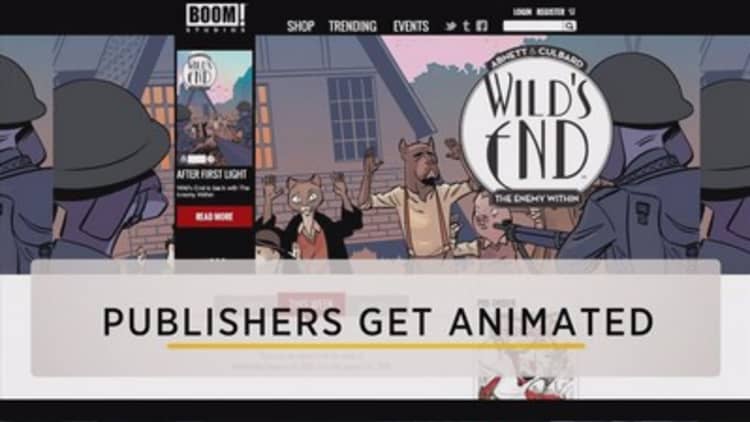
Over the last 10 years, Dynamite Entertainment, IDW Publishing and BOOM! Studios have done what few mid-size comic book publishers have been able to do: survive.
The trio put out a wide range of series owned by their creators, but key to their success has been licensing well-known media properties — everything from "Transformers" to "Game of Thrones," "Mighty Morphin Power Rangers" to "Sons of Anarchy." In a North American comic book market estimated to be at least $800 million, independent titles draw in fresh audiences, excite old fan bases hungry for new stories and underwrite the companies' original series.
The publishers have proved successful at identifying licensed characters that would move about 5,000 or 10,000 issues per month in comic book stores, said Jonathan Jackson Miller, a writer who analyzes comic book sales.
Read MoreThat comic under your bed could be worth a fortune
To be sure, sales can exceed that range, but they generally fly below the level that comics titans Marvel and DC target. Selling through bookstores, book fairs, mainstream retailers, and digital storefronts has allowed smaller, more nimble publishers to sell tens of thousands more copies beyond the comic shop, publishers and experts said.
We need someone who's going to be the driving force for that editorial, because otherwise you get comic books that just aren't very good.Ted AdamsIDW CEO and publisher
Indie comic book success is something of a rarity, as no publisher has achieved sustainability at that scale since a batch of Marvel's most popular artists struck out to form the creator-owned Image Comics. That took place at the height of the comic book bubble in 1992.
The phenomenon that spelled doom for many small publishers was known as the rule of eight, said Jackson Miller. "Anyone that got past eight titles died," he said. "There isn't a surviving company that started in that period that published more than eight titles until you get to IDW and Dynamite" in 2005.
The explosion of television and film content over the last decade is part of what has made the business sustainable, said Joseph Rybandt, editorial director at Dynamite.
That has allowed Dynamite to put together a diverse portfolio that includes pop culture smashes like "A Game of Thrones" and "Terminator," literary classics such as Sherlock Holmes, and pulp comic favorites Vampirella and Red Sonja.
"If we did just have 'A Game of Thrones,' from a business standpoint, I don't think that would be sustainable business," Rybandt said.
Ideally, publishers want to partner with rights holders that generate big, recurring media events — namely film releases, he said. Without that regular infusion, the core fans will stick around, though overall interest will wane, he said. Titles fitting that bill include Dynamite's newly released James Bond series and IDW's "Star Trek," "Transformers" and "G.I. Joe" comics, he said.
With fans eagerly anticipating a 2017 movie relaunch of "Mighty Morphin Power Rangers," BOOM! Studios released a new series based on the early '90s television show this month.
Familiar licensed content presents publishers with a way to support riskier original projects, said Filip Sablik, president of publishing and marketing at BOOM! Studios.
Still, publishers shouldn't treat licenses like cash cows and saturate the market, he cautioned. Until recently, comics based on licenses were often seen as inferior to those featuring characters born out of the medium — in part because publishers weren't always good stewards, he added.
"Why put out something sub-par?" Sablik asked. "At that point it just becomes parasitic on the license and you're just trying to extract whatever money you can from the fans and the audience."
In a bid to do right by the licence, BOOM! requires that someone at the company has a vision for the property before they take it on. The company picked up Cartoon Network's "Adventure Time" because an editorial assistant caught on to it early and saw its appeal, Sablik said. Since then, the show about a boy and his dog's exploits in an absurd post-apocalyptic world has become a cult hit.
A creator with a passion for the project is the starting point for licenses at IDW, as well, said CEO and publisher Ted Adams.
"We need someone who's going to be the driving force for that editorial, because otherwise you get comic books that just aren't very good," he said.
That said, IDW runs through lists of potential licenses every week, Adams said. In the event there is no obvious candidate to take the helm, he will recruit new talent for the right opportunity.
IDW has acquired some of the strongest, most enduring licenses in the business, including "Teenage Mutant Ninja Turtles," "X-Files" and "My Little Pony."
Next stop: TV and film
Now, IDW and others are ramping up efforts to adapt their own properties for television and film.
After watching partners fail to bring projects to pilot, IDW is now taking a larger role in financing productions. In turn, it gets more control over the direction of the series and a bigger share of the profits.
This year, an adaptation of IDW's supernatural special agent "Wynonna Earp" will premiere on SyFy, and USA Network is developing its modern-day werewolf book, "Brooklyn Animal Control."
Meanwhile, BOOM! is working with Fox to adapt its breakout female-centered "Lumberjanes" comic into a feature film and teaming with Universal to bring the otherworldly mystery "The Woods" to the small screen.
Back in the comic shop, the competition is heating up. Now that the business model has been proved, securing licenses is getting tougher, said Rybandt.
British publisher Titan Books is new to licensing for comics but has already secured rights to sci-fi classic "Doctor Who" and "Assassin's Creed," a popular gaming franchise and soon-to-be film.
"When there's success, you're going to have more people trying to get into the pool, and you're going to have a greater competition when it comes to the licenses," Sablik said.
DISCLOSURE: SyFy Network is owned by NBC Universal, the parent company of CNBC.com.






